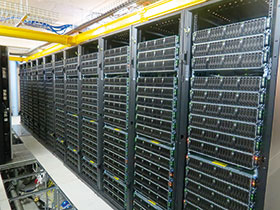

The Centre for High Performance Computing (CHPC) of the Council for Scientific and Industrial Research (CSIR) has created the fastest supercomputer on the continent, with processing speed capable of a thousand trillion floating point operations per second.
Floating point operations (flops) are used in computing to calculate extremely long numbers. With over 40 000 cores, the new machine is the fastest computer in Africa owing to its speed of roughly 1 petaflop (1000 teraflops). That is 15 times faster than the system it succeeds, which was named Tsessebe (Setswana for antelope). Aptly, the new beast is called Lengau, which is the Setswana word for cheetah.
Dr Thomas Auf der Heyde, Deputy Director-General: Research Development and Support at the Department of Science and Technology (DST), outlined the role high-performance computing plays in growing the economy. “For our country to grow at the required rate, as set out in the National Development Plan, it needs to change gear by building capacity in the production and dissemination of knowledge,” he explained.
“The CHPC represents a deliberate move by this country to invest in modernising our research and development. High-performance computing and advanced data technologies are powerful tools in enhancing the competiveness of regions and nations.”
Dr Happy Sithole, the director of CHPC, detailed the journey leading to the unveiling of the new PFLOPs machine: “When we started in 2007, we took inspiration from the fastest animals in the land and named our first high-performance computing system iQudu (Xhosa for kudu) which boasted 2,5 teraflops).
“In 2009 there was increased demand for computational resources, and a new high-performance computing system dubbed the Tsessebe was launched. It boasted 24,9 teraflops and became number 311 on the TOP500 supercomputers, and ranked number one in the African continent. The system was later upgraded to 64,44 teraflops,” he said.
The technology powering Lengau means that it is also smaller in footprint than the previous system. The Dell HPC system is comprised of 1039 Dell PowerEdge servers based on Intel Xeon processors, totalling 19 racks of compute nodes and storage. It has a total Dell Storage capacity of 5 petabytes, and uses Dell Networking Ethernet switches and Mellanox EDR InfiniBand with a maximum interconnect speed of 56 GBps.
More than simply securing continental bragging rights, Lengau will provide increased access to computer resources for users who previously had limited or no access owing to capacity constraints. It will also ensure improved performance of large-scale simulations that were impossible in the past, opening completely new avenues of research, and provide greater capacity to build the private sector/non-academic user base of the CHPC for improved national economic benefit.
For more information contact Tendani Tsedu, CSIR, +27 (0)12 841 3417, [email protected], www.csir.co.za

© Technews Publishing (Pty) Ltd | All Rights Reserved